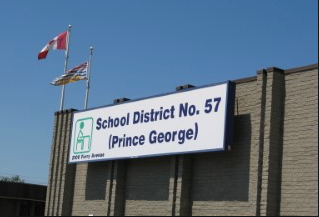In the wake of last week's decision by the provincial government to close all kindergarten-Grade 12 schools in B.C., teachers in the Prince George school district have been told they are expected to show up for work next week to begin the transition to online instruction.
Whether that actually happens Monday, after a two-week long spring break, remains to be seen.
The COVID-19 pandemic has steadily worsened in the two weeks since classes were dismissed March 13 and with local businesses and public buildings forced to close to reduce the risk of spreading the virus, it is doubtful the nearly 1,000 teachers in School District 57 will be returning to their schools any time soon.
"Teachers have a lot of questions we haven't received answers for yet, and that's not a fault of anyone here, it's the government trying to reassure people but not having the answers as they're putting out information," said Prince George District Teachers Association president Joanne Hapke.
"One of the main concerns is the fact our prime minister and Dr. Bonnie (Henry, B.C's public health officer) are telling people to stay home, but yet the government is telling teachers to report to work. We have schools that have over 50 employed in it and there are a lot of concerns about that."
Education Minster Rob Fleming announced a week ago the plan to switch to online teaching but offered few details at the time on how that would be accomplished
“Teachers will be prepared to plan for continuity of learning when their respective spring breaks were originally scheduled to end, March 30," said Fleming, at the time. "We will continue to work in consultation with our education partners as we plan how we will provide ongoing education services. We will be in frequent contact with school districts and school authorities to ensure we work through this challenge together and to look for best practices as plans are developed."
Since then, the government has been silent on what it has planned for schools.
"I've been able to reassure teachers up to this point and let's wait to see what the district has to say before we increase our stress and worry and we'll respond to what the district says," said Hapke. "What I hope they will say is that ideally, schools will not be open to anyone next week. We have to flatten this curve (of increasing COVID-19 cases) and putting people into buildings is not ideal, especially when everything else is closing.
Hapke expected to find out more about the what's in store for teachers and students later Tuesday with SD 57 superintendent Anita Richardson and other school officials at the board office on Ferry Avenue. The school district was not willing to provide any details about what was discussed in that meeting and will not be sharing any information about its plan for local schools until later in the week.
"I would say give us another week and let the district continue to create a plan that will work and I'm hopeful they will say to teachers who are vulnerable, stay home," said Hapke. "If they have a compromised immune system or are looking after someone with a compromised immune system or if they have child care issues, let the teachers stay home and do their work from home. Everyone's priority is health and safety."
While most of the 550,000 public school students in the province have access to home computers, not all of them do and Hapke wonders how online lessons will work for everyone in the ministry's continuous learning model. She said one possible solution if teachers are not allowed or equipped to work from home is to stagger shifts to minimize the number of people in each school at one time.
"There are things people can do who are OK with going in the building to access material so they can prepare it for students," said Hapke. "A lot of the teachers are saying they can do this from their homes. Teachers want to be able to support their students but they need to be able to do it a way that's safe for everybody."
Hapke said the issue of child care and meal programs at the schools for disadvantaged students or students living in care also needs to be addressed.
"We are most concerned about our vulnerable students and worry about what is happening with them right now," she said. "We always are concerned when there is a break from school but now that there's a prolonged break it really ramps up our concerns for them and what can we be doing to support them."
The COVID-19 crisis has turned the world upside-down and nothing could prepare society for the far-reaching ripple effects as the global pandemic insinuates itself as the most alarming calamity since the Second World War. It is likely to keep schools closed for the first time since the 10-month job action of B.C. teachers in 2011-12, which resulted in a three-day strike in March 2012.
"With strikes, there's a playbook, we all know what we have to do and when we have to do it," said Hapke. "With this, there is no playbook, it's being developed. People are talking about the playbook as if it is developed and it's not.
"Everyone's situation is unique, one size will not fit all. People have questions and they are worried."



